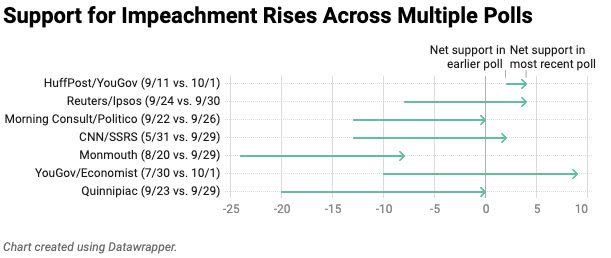New Polling Makes It Clear: Support For Impeachment Is Up
Public opinion in the U.S. has shifted significantly in favor of impeachment, according to a new wave of national polling.
Polls from CNN/SSRS, Monmouth, Quinnipiac, Reuters/Ipsos, Economist/YouGov, as well as new HuffPost/YouGov polling, together paint a clear picture of growing support for impeachment in the wake of House Speaker Nancy Pelosi’s (D-Calif.) announcement that she backs an “official impeachment inquiry.”
There’s still plenty of variation in the exact levels of support that different pollsters find for impeachment, in part because there’s also a lot of variation in exactly what questions those pollsters are asking. But as the chart below demonstrates, the direction in which opinion has moved is both consistent and apparent.

For the first time, polls also generally find support for impeachment tying or modestly outstripping opposition. FiveThirtyEight’s impeachment tracker, which aggregates the polling from a number of outlets, puts support for impeachment at about 47%, with opposition at about 45%. At the beginning of September, average support stood at about 39%, with opposition near 53%.
The polling doesn’t offer a total consensus about exactly who are changing their minds on impeachment. A number of surveys, including initial HuffPost/YouGov polling, found that the movement was due mostly to Democrats, who followed their party’s leaders in coalescing around support for an inquiry. Others, however, also found rising support among independents or even Republicans.
Democratic backing for impeachment is increasingly verging on the universal, with most polls finding three-quarters or more in support. In the most recent Quinnipiac survey, 90% of Democratic voters said Trump “should be impeached and removed from office,” and 95% favored the Democrats’ impeachment inquiry. If support for impeachment is to continue to grow much further, it’ll also need to make inroads beyond just the party ― a path that’s complicated by the already-polarized reactions to Trump’s conversation with the leader of Ukraine.
This week’s new HuffPost/YouGov poll, the second of our surveys conducted entirely in the wake of Pelosi’s announcement, finds less evidence that the initial spike in support for impeachment has led to continuing momentum.
It finds support for impeachment, if anything, dipping from its initial spike last week, although the change is within the poll’s margin of error. Americans support impeachment 44% to 40% in the latest poll, compared to the 47%-to-39% margin a week prior.
A bigger change within the last week is that more Americans have started paying attention to the story. About half the public now says they’ve heard a lot about Trump’s call to the Ukrainian president, up from 37% last week.
The GOP, meanwhile, is coalescing around the defense that Trump’s actions weren’t out of the ordinary. In last week’s poll, 43% of Republicans said they thought most U.S. politicians would be willing to ask a foreign government to investigate a political opponent, as the president has; in the most recent survey, that number rose to 63%. Numbers among Democrats and independents for that question barely budged.
Use this link to further explore the results of the HuffPost/YouGov survey, using the menu at the top to select survey questions and the buttons at the bottom to filter the data by subgroups.
The HuffPost/YouGov poll consisted of 1,000 completed interviews conducted Sept. 30-Oct. 1 among U.S. adults, using a sample selected from YouGov’s opt-in online panel to match the demographics and other characteristics of the adult U.S. population.
HuffPost has teamed up with YouGov to conduct daily opinion polls. You can learn more about this project and take part in YouGov’s nationally representative opinion polling. More details on the polls’ methodology are available here.
Most surveys report a margin of error that represents some but not all potential survey errors. YouGov’s reports include a model-based margin of error, which rests on a specific set of statistical assumptions about the selected sample rather than the standard methodology for random probability sampling. If these assumptions are wrong, the model-based margin of error may also be inaccurate. Click here for a more detailed explanation of the model-based margin of error.
Love HuffPost? Become a founding member of HuffPost Plus today.
This article originally appeared on HuffPost.

